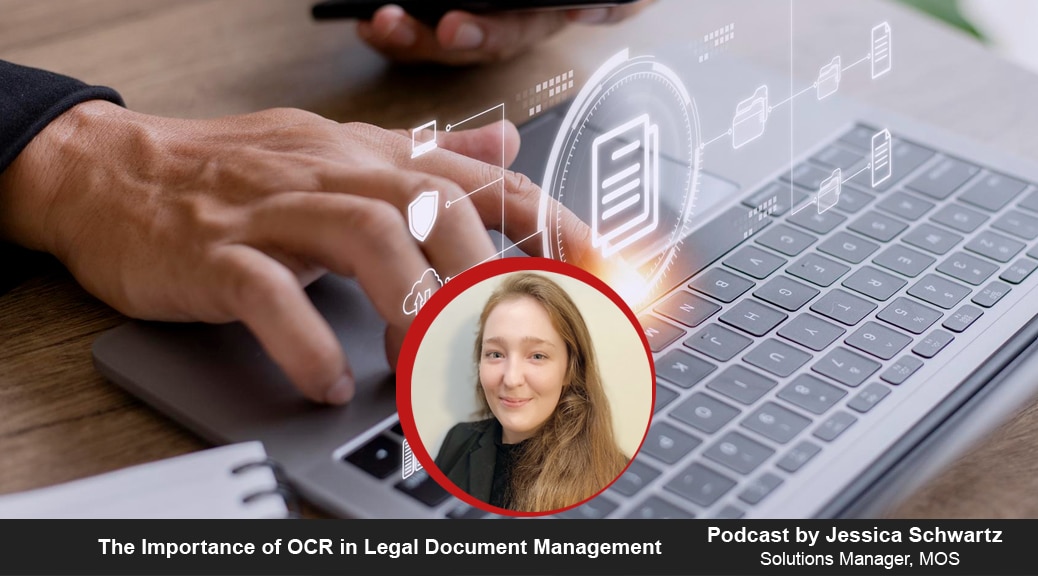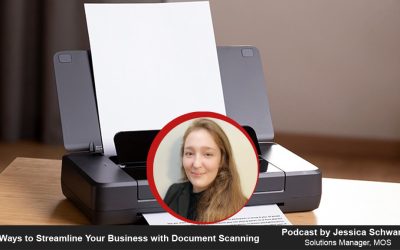Managed Outsource Solutions (MOS) delivers top-notch optical character recognition (OCR) solutions and OCR cleanup services for all industries. We are widely recognized for document conversion excellence. Our comprehensive OCR process employs advanced software that meticulously analyzes printed text, transforming it into a readily searchable, indexed, and retrievable electronic format. This ensures enhanced efficiency and accuracy in handling documents.
In this podcast, Jessica Schwartz, Solutions Manager at Managed Outsource Solutions (MOS), discusses significance of OCR for processing legal documents.
Podcast Highlights
02:06 Importance of Legal OCR
03:49 Importance of Searchability in Legal Documents
Read Transcript
My name is Jessica. I’m the Solutions Manager at Managed Outsource Solutions, and I’m here to talk to you about the significance of OCR for processing legal documents.
The legal industry is widely recognized as one of the most highly regulated sectors in the world. A rising trend in this field is legal informatics, which involves the digitization of legal data. Given the abundance of legal information, ensuring security and accuracy is paramount. The initial step in legal informatics is extracting text from legal documents using digital tools, with Optical Character Recognition (OCR) technology being particularly useful in this regard. When combined with AI technology, OCR automation becomes a powerful and indispensable component of legal informatics, revolutionizing legal operations by enhancing their ease, efficiency, and effectiveness. With OCR, legal firms can process, monitor, and evaluate vast amounts of data, including sensitive client information such as personal and security details.
In recent years, there has been rapid growth in the use of digital tools and automation within legal departments. Reports indicate that US law firms alone have invested approximately $2.7 billion in legal sector automation over the past two years. It is estimated that by the end of 2025, large organizations will require a minimum of four legal technology vendors to manage their legal aspects. Legal tech and automation will be highly prioritized to cope with the increasingly complex demands of the judicial system. Consequently, the proportion of legal budgets allocated to technology is expected to substantially increase by 2025.
02:06 The Importance of Legal OCR
The importance of legal OCR lies in its ability to extract text from scanned documents and images, converting them into meaningful digital data for archiving or further use. Digitizing legal documents facilitates easy data retrieval, enabling faster and more accurate analytics, as well as informed decision-making across all legal processes.
Legal establishments typically deal with extensive volumes of case sheets and various types of legal documents, such as contracts, law commission reports, tribunals, case sheets, acts, and agreements, each used in different settings and scenarios. Moreover, large companies must keep track of contracts, negotiations, takeovers, bids, and other legally binding documents. The combination of a vast amount of legal documents and inconsistent filing practices makes accessing legal information an extremely time-consuming task, even for highly competent legal professionals. The manual handling of documents and data management contributes to operational inefficiencies and coordination challenges. This is where OCR technology plays a pivotal role in digitally extracting legal text. It enables efficient management of legal documents and information, allowing for quick retrieval of relevant information through simple keyword searches within a database.
03:49 Importance of Searchability in Legal Documents
Searchability is another crucial aspect of legal documents. Despite the increasing use of digital tools and document management in the business sector, legal companies have not yet fully integrated technology into their judicial processes. A lack of awareness regarding available tools and their inherent benefits is a primary reason for this slow adoption.
The digitization of legal documents begins with the meaningful extraction of text from paper documents. This process differs significantly from extracting data from other document types due to the length, complex structure, and unique vocabulary of legal documents. Data extraction aims to enable data retrieval using specialized search engines or other digital tools. Key areas to be retrieved in various legal aspects include judgment headnotes, names of judges and juries, legal subjects or keywords, legal acts/sections/rules/articles, and legal time frames, and more.
Prior to the introduction of OCR technology, manual retyping of text was the only option for digitizing printed paper documents, a time-consuming method prone to errors. However, with OCR processing, scanned paper documents can be easily edited and searched within word processing software using a Microsoft Word or Google Docs.
Here are the top reasons why searchability in legal documents is crucial.
Mandatory for eFiling: Most courts now require text searchability in eFiled documents, making it easier for attorneys and examiners to review filings. The ability to copy and paste text is highly valued by court officials.
You can also quick search in large files: The ability to find any word in any file simply by searching can be revolutionary for legal professionals. It can be easy to analyze files from opposing counsel when you can examine by a term.
Minimize error rates: Converting paper documents to digital files through OCR helps prevent errors and incorrect sentences, ensuring accurate replication when copying aspects of the document. Making PDF documents searchable can be achieved by publishing them directly from word processing software or by applying OCR within PDF software.
Undoubtedly, OCR has revolutionized the legal industry, resolving challenges associated with paper workflows. OCR can be employed in various ways within the legal domain, and many scanners now come equipped with built-in OCRs that perform basic text extraction. Additionally, OCR helps streamline legal workflows and enables faster document processing. Partnering with a reliable legal process outsourcing company can standardize documents by transforming scanned documents into searchable PDFs or any other desired file format.
Reach out to us today!
Thank you! We hope you have a good day!




